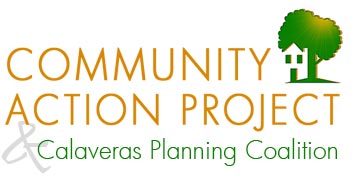project focused on sustainable land use planning.
Find out more about us >>
County puts its future on the map
By Kristine Williams | Posted: Friday, March 22, 2013 8:29 am
http://www.calaverasenterprise.com/news/article_8400561e-9303-11e2-a6af-001a4bcf887a.html
General plan takes a big step forward
As promised, Calaveras County ’s emerging general plan envisions more open space on the outskirts of larger, core communities.
It continues to be a work in progress, however.
A special joint meeting between the Board of Supervisors and the county’s Planning Commission Tuesday drew an audience of nearly 50. Supervisors and commissioners found agreement with the new map’s vision that reverses “a sea of yellow” that mostly dominated the current general plan’s land use map.
Yellow was the designated color of rural housing tracts that largely lay outside existing town centers. Instead, the new map transformed these lands to green and they are now labeled “resource production” lands.
Resource production lands are intended to be preserved, used for crop production, vineyards, livestock, timber and mineral production. A proposed 40-acre minimum lot size, advocated by supervisors in a 2007 vote, was supported to keep resource production lands rural, but John Buckley, representing the Central Sierra Environment Resource Center, pointed out that the staff report showed a roughly “50-50 split,” allowing nearly as many new housing units to be accommodated in the new sea of green – through the parcel splits and existing lots – as in community centers.
He recommended that planning staff provide some different methods on how to reduce development outside community centers.
Former District 4 supervisor Tom Tryon, though now an audience member, also voiced his support for the philosophy of focused development.
“Sprawl can be very damaging,” said Tryon. “We need community plans that accommodate growth, everyone agrees on that.” But, he said, when it comes to getting residents to agree to accommodate growth in their respective communities a “not in my backyard” attitude pops up.
“Sensible economic policy has to start and end in community centers,” Tryon continued. He characterized the process of getting residents to support development within their communities as “the hardest part and greatest political challenge because that’s where most of the people live who elect you.”
Other concerns voiced were in regards to “carrying capacity” numbers provided in an accompanying staff report. Some numbers – which represent an estimate of the potential number of units and population that could be accommodated if every parcel were buildable – translated to sticker shock for audience members.
Numbers that showed an additional 16,654 persons in Copperopolis and more than 9,000 persons added to Arnold – the two communities with the highest unit and population estimates – proved unpalatable for most.
“Copperopolis’ potential would eliminate the rural atmosphere,” said Buckley. “Where would those (3,900 additional Arnold units) go in a feasible way? It’s not right for the people of Arnold to have that.”
Planning staff members sought to alleviate concerns by reminding the audience that such extreme growth rates would eventually translate to “background numbers” and were highly unlikely to occur and that the state Department of Finance projects only a modest 10,000 additional persons living in Calaveras County by 2035, the end date for the general plan – far less than the proposed general plan’s accommodation of 80,539 additional residents.
“The carrying capacity is not a solvent number,” said General Plan Coordinator Brenda Gillarde. “It’s not etched in concrete. … We want a number we can hang our hat on.”
Approval from both the board and commission now allows for a 30-day public review period of the land use map. Once closed, the Planning Department can move forward with the county’s general plan update process – specifically beginning environmental studies to complete a CEQA required environmental impact report. A public scoping meeting regarding the EIR is next on the general plan update agenda. A formal date has not yet been selected but will be announced “soon” according to Gillarde.
Anyone who would like more information on the general plan update process is encouraged to visit the county’s general plan update website, viewable on the county website: co.calaveras.ca.us. Navigate to the “Departments” tab and select “Planning.”
Those with questions can email gpupdate@co.calaveras.ca.us or call the Planning Department at 754-6394.

